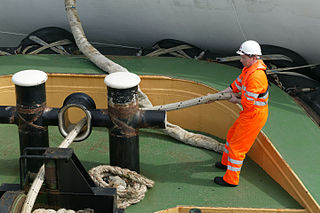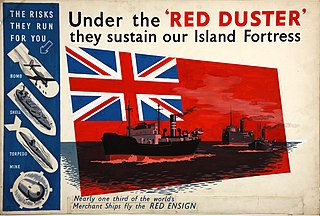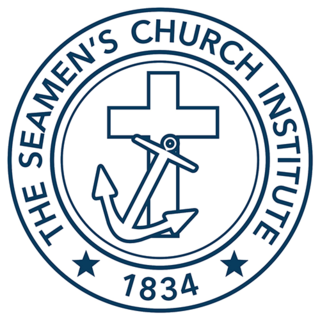
Maritime transport or more generally waterborne transport, is the transport of people (passengers) or goods (cargo) via waterways. Freight transport by sea has been widely used throughout recorded history. The advent of aviation has diminished the importance of sea travel for passengers, though it is still popular for short trips and pleasure cruises. Transport by water is cheaper than transport by air or ground, but significantly slower for longer distances. Maritime transport accounts for roughly 80% of international trade, according to UNCTAD in 2020.

The United States Merchant Marine is an organization composed of United States civilian mariners and U.S. civilian and federally owned merchant vessels. Both the civilian mariners and the merchant vessels are managed by a combination of the government and private sectors, and engage in commerce or transportation of goods and services in and out of the navigable waters of the United States. The Merchant Marine primarily transports domestic and international cargo and passengers during peacetime, and operate and maintain deep-sea merchant ships, tugboats, towboats, ferries, dredges, excursion vessels, charter boats and other waterborne craft on the oceans, the Great Lakes, rivers, canals, harbors, and other waterways. In times of war, the Merchant Marine can be an auxiliary to the United States Navy, and can be called upon to deliver military personnel and materiel for the military.
The National Union of Ship's Stewards, Cooks, Butchers and Bakers was the principal trade union for service personnel serving aboard British merchant ships between 1909 and 1921.

The Mission to Seafarers is a Christian welfare charity serving merchant crews around the world. It operates through a global Mission 'family' network of chaplains, staff and volunteers and provides practical, emotional and spiritual support through ship visits, drop-in seafarers centres and a range of welfare and emergency support services.

The Merchant Marine Act of 1920 is a United States federal statute that provides for the promotion and maintenance of the American merchant marine. Among other purposes, the law regulates maritime commerce in U.S. waters and between U.S. ports. Section 27 of the Merchant Marine Act is known as the Jones Act and deals with cabotage. It requires that all goods transported by water between U.S. ports be carried on ships that have been constructed in the United States and that fly the U.S. flag, are owned by U.S. citizens, and are crewed by U.S. citizens and U.S. permanent residents. The act was introduced by Senator Wesley Jones. The law also defines certain seaman's rights.

Captain James Harvey Tomb served as superintendent of the New York State Merchant Marine Academy and was appointed the first superintendent of the United States Merchant Marine Academy on April 15, 1942.

Albert Joseph Herberger was a Vice Admiral of the United States Navy, and the first United States Merchant Marine Academy graduate to attain the rank.

The International Christian Maritime Association (ICMA) is an ecumenical association of 26 Christian organisations, Protestant and Catholic, representing different churches and Christian communities actively engaged in welfare work for people who work at sea, including seafarers, fishers and the families of both. The Association is registered as a charity in the UK and, through its members, operates internationally.
Shannon J. Wall was a merchant seaman and an American labor leader. He was president of the National Maritime Union from 1973 to 1990. His father and mother ran a small dry cleaning company.
The maritime history of the United States is a broad theme within the history of the United States. As an academic subject, it crosses the boundaries of standard disciplines, focusing on understanding the United States' relationship with the oceans, seas, and major waterways of the globe. The focus is on merchant shipping, and the financing and manning of the ships. A merchant marine owned at home is not essential to an extensive foreign commerce. In fact, it may be cheaper to hire other nations to handle the carrying trade than to participate in it directly. On the other hand, there are certain advantages, particularly during time of war, which may warrant an aggressive government encouragement to the maintenance of a merchant marine.

A merchant navy or merchant marine is the fleet of merchant vessels that are registered in a specific country. On merchant vessels, seafarers of various ranks and sometimes members of maritime trade unions are required by the International Convention on Standards of Training, Certification and Watchkeeping for Seafarers (STCW) to carry Merchant Mariner's Documents.
The maritime history of the United States (1800–1899) saw an expansion of naval activity.
The United States merchant marine forces matured during the maritime history of the United States (1900–1999).
The maritime history of the United States (2000–) delineates the continued readiness of the American merchant marine.

The Seamen's Church Institute is an American maritime nonprofit organization that serves mariners and seafarers through chaplaincy, crisis response, training, feasibility studies, legal advocacy, and maritime policy. Founded in Lower Manhattan in 1834, it is affiliated with the Episcopal Church. With a budget of over $7 million, SCI is the largest, most comprehensive mariners’ agency in North America. The institute is headquartered in New York City and operates the International Seafarers’ Center in Port Newark, Centers for Maritime Education in Paducah, Kentucky, and Houston, Texas, and the Center for Mariner Advocacy in New Orleans, Louisiana.

Filipino seamen, also referred to as Filipino seafarers or Filipino sailors, are seamen, sailors, or seafarers from the Philippines. Although, in general, the term "Filipino seamen" may include personnel from the Philippine Navy or the Philippine Marine Corps, it specifically refers to overseas Filipinos who are "sea-based migrant Filipino workers".
The Merchant Navy Welfare Board is a registered charity located in Southampton, England, that acts as the welfare umbrella for the United Kingdom Merchant Navy and fishing fleet charity sector. Its mission statement is "Supporting the provision of quality welfare services for seafarers and their dependants."

A sailor, seaman, mariner, or seafarer is a person who works aboard a watercraft as part of its crew, and may work in any one of a number of different fields that are related to the operation and maintenance of a ship.

Stephen Cotton is the general secretary of the International Transport Workers’ Federation (ITF) – a global union federation of 677 trade unions representing 19.7 million workers in 149 countries in the seafaring, port, road, rail, tourism and aviation sectors. He was elected to the position at the 43rd ITF Congress held in Sofia, Bulgaria in 2014 and reelected at the 44th ITF Congress held in Singapore in 2018.

The Government Shipping Office is an agency in the Government of Pakistan that registers and manages sailors in the Pakistan Merchant Navy. The Government Shipping Office was first established in 1923 under the Merchant Shipping Act. It was a subordinate office of the then-Ministry of Communications, now reorganised as the Ministry of Ports and Shipping, under the administrative control of Ports and Shipping Wing, Karachi.













